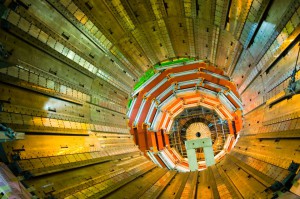4th November 2013
Isn’t Knowledge GREAT? Origins of Universe Bring Nobel Prize to UK
Serendipity, “The God Particle” and Turkish-British Collaboration in Science – a guest blog by Dr. Başak Candemir, Science and Innovation Officer, British Consulate-General Istanbul
 On 8 October, the Nobel Committee awarded the Physics Prize jointly to British scientist Peter Higgs and Belgian scientist Francois Englert. Professor Higgs gave his name to the the “Higgs Boson” or Higgs Particle, sometimes called “The God Particle” although Professor Higgs himself dislikes this term.
On 8 October, the Nobel Committee awarded the Physics Prize jointly to British scientist Peter Higgs and Belgian scientist Francois Englert. Professor Higgs gave his name to the the “Higgs Boson” or Higgs Particle, sometimes called “The God Particle” although Professor Higgs himself dislikes this term.
The existence of the Higgs Boson was confirmed on July 4, 2012, which provided the final validation of the Standard Model, a theory of particle physics, which helps explain the existence of everything in the universe. But in addition to recognising the quality of the science, the Nobel Prize also underlines how global and collaborative science has become – a phenomenon which includes the work of many top Turkish scientists.
Science: serendipity or investment?
The discoveries of penicillin by Alexander Fleming or of microwave by Percy Spencer are examples where serendipity has crossed roads with scientists (moral of microwave research: beware observing eggs in tea-kettles). But serendipity alone cannot explain the fact that the United Kingdom has won 23 Nobel Prizes in Physics and has the highest number of Nobel prizes per capita. Rather, it is a demonstration of a tradition of investing in and developing science.
Peter Higgs was born in Newcastle upon Tyne in 1929, was educated in the UK and worked at the Imperial College, UCL and University of Edinburgh where he is an emeritus professor. His work builds on a strong tradition of particle physics research in the UK, including the work of scientists such as Thompson, Rutherford, Cockcroft, Chadwick and Dirac. This work has helped make the UK a global leader in science.
Global collaborations in science
But these days science is a truly global business. The Nobel Prize was awarded to two scientists. But a critical element behind the discovery of the Higgs Boson was The European Organization for Nuclear Research, CERN and the Large Hadron Collider – a brilliant example of international science collaboration. The UK is a key partner in global-scale scientific facilities such as CERN and the Large Hadron Collider, the Square Kilometre Array (to produce the world’s largest radio telescope) or the ITER fusion project (to produce energy through nuclear fusion).
One of the countries participating in CERN is Turkey, a country with which the UK has a strategic partnership. Six Turkish universities participate in CERN of which two are among the top 400 list of World University Rankings of Times Higher Education: Middle East Technical University (METU) and Boğaziçi University. Both universities have links with the UK and are working on solving the current and future problems. For example, METU and Swansea University are working on a mobile security project and Boğaziçi University is working with the University of Cambridge on next generation biofuels. Both of these collaborations are supported by the British Council.
The UK is keen to promote collaboration in science and innovation and is actively building links with leading and emerging countries in this field, including Turkey. The British Council has long promoted education and science links between the UK and Turkey; and since 2011 the UK Science and Innovation Network has included Turkey in its network. In September 2011 the two countries signed the UK-Turkey Knowledge Partnership as a commitment to collaboration in education, science, innovation and trade.
Who knows, the future may bring a Nobel prize for the collaboration of a UK and Turkish scientist.